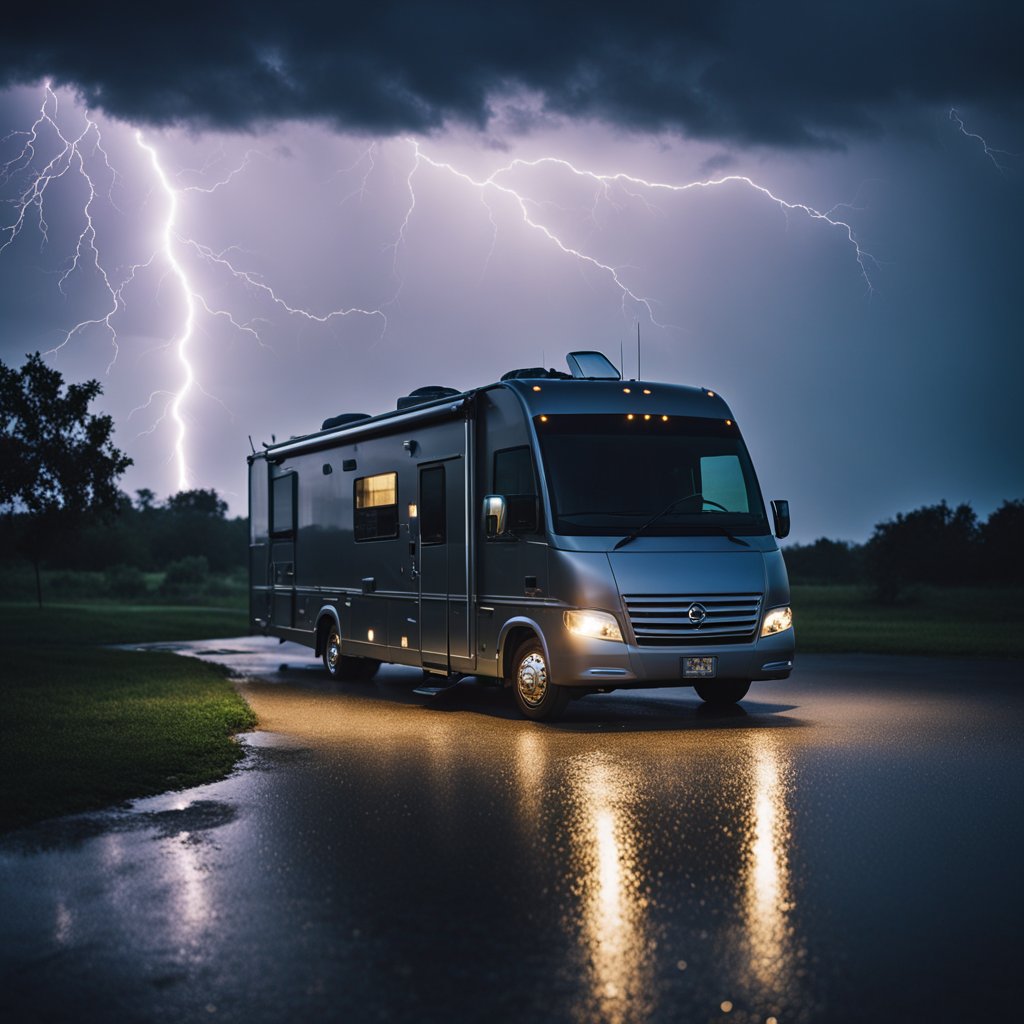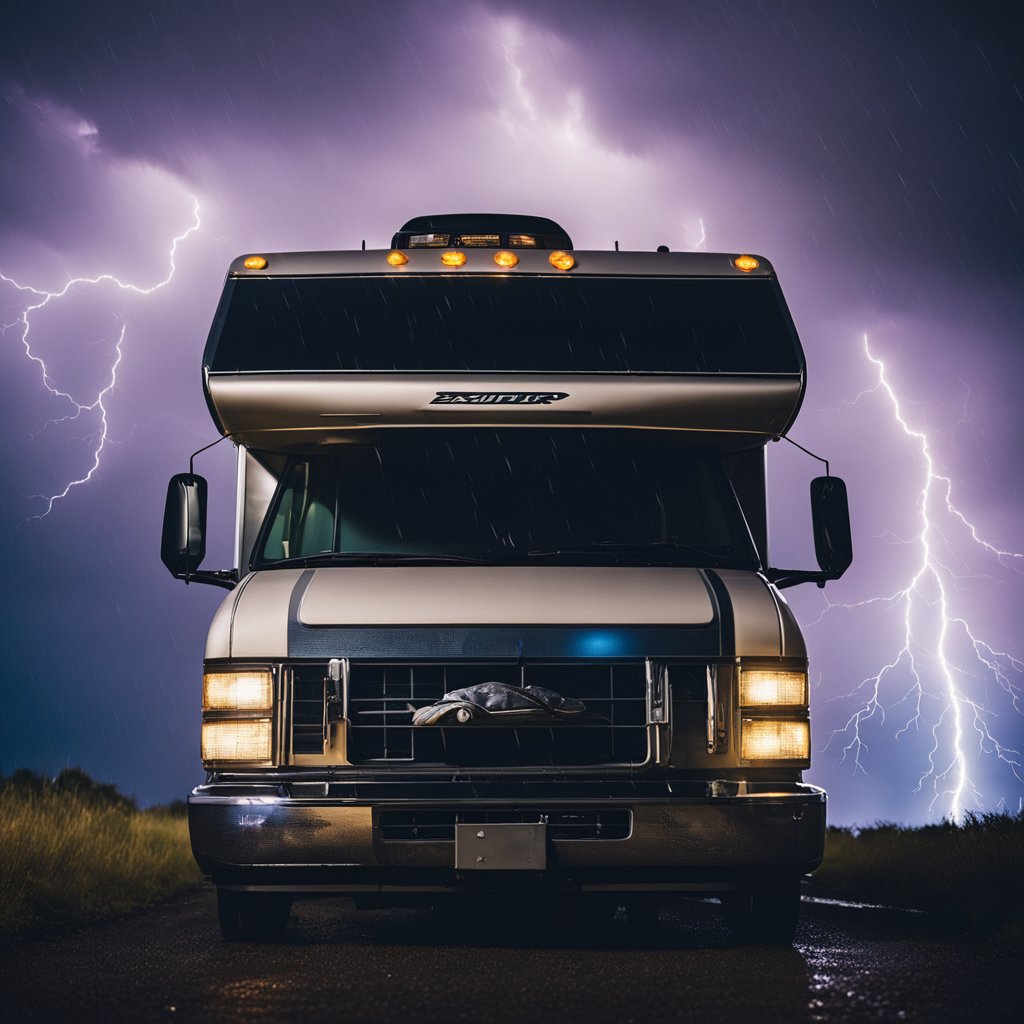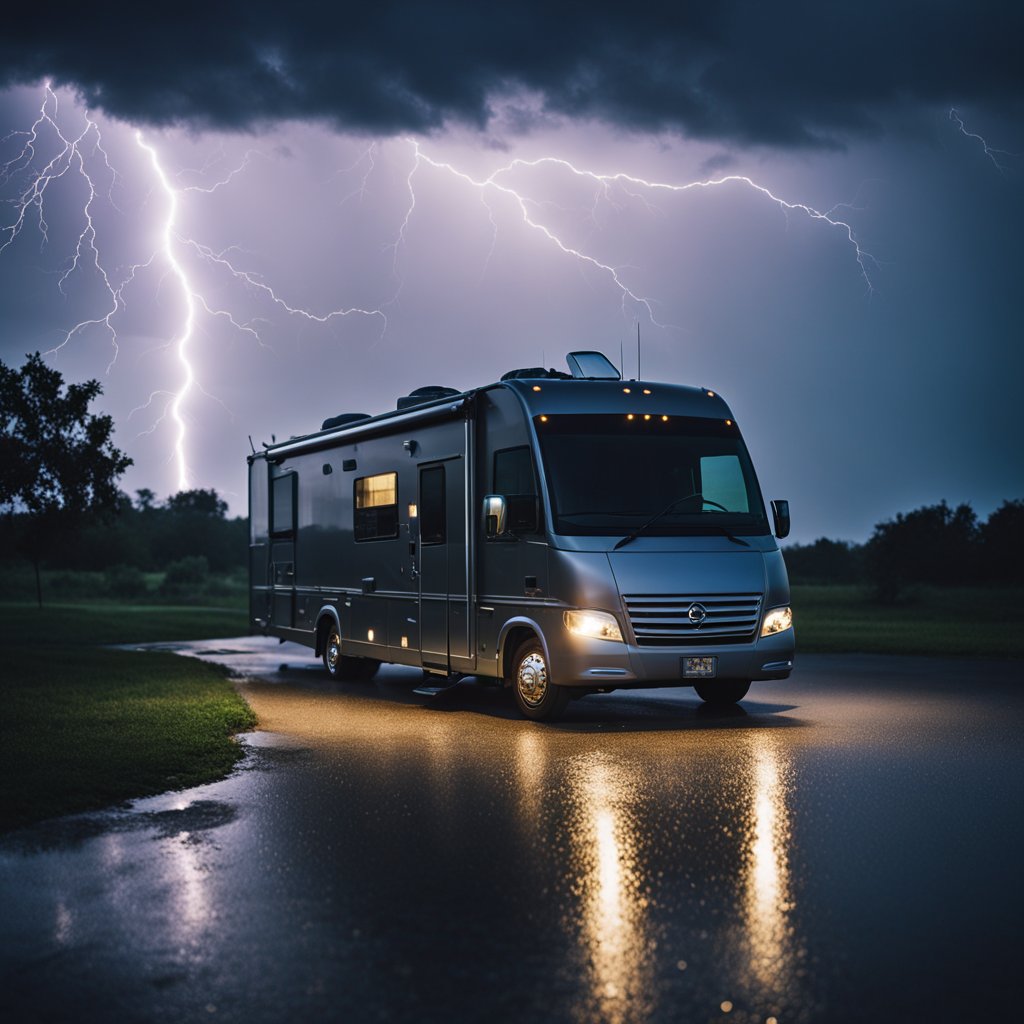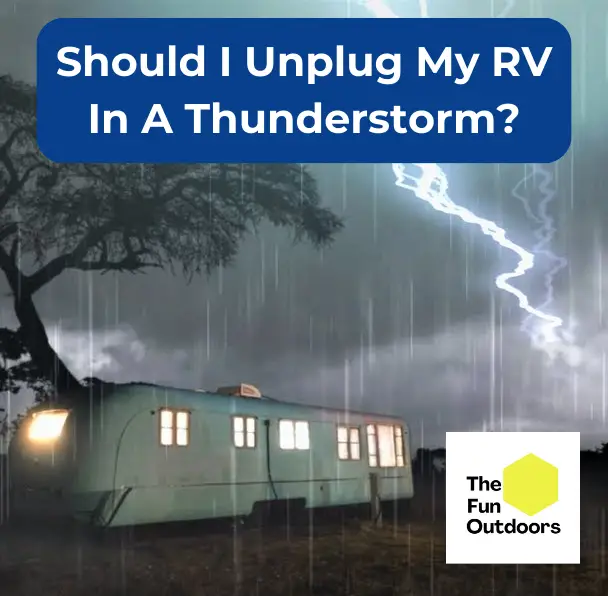Are you an RVer wondering if your RV could get damaged during a thunderstorm? Thunderstorms can be a cause for concern for RVers, especially when it comes to the safety of their RV and its contents. Lightning strikes can cause severe damage to electrical and electronic appliances, leaving you with costly repairs. So, should you unplug your RV during a thunderstorm?
Yes, you should unplug your RV during thunderstorms to protect your RV’s electrical systems and other components connected to it. You should also unplug appliances and shut down any additional electronics until the storm passes.
Key Takeaways
- Unplugging your RV during a thunderstorm is the best way to minimize the risk of damage to your RV and its contents.
- RVs with an outer layer of metal are safer during lightning strikes than those made of fiberglass and wood.
- Taking precautions such as shutting all windows and staying informed about weather conditions can help you stay safe during a thunderstorm.
RV In A Thunderstorm: Concerns and Precautions

If you’re an avid RV enthusiast, you may be wondering whether you should unplug your RV during a thunderstorm.
Thunderstorms can be unpredictable and dangerous, and it’s important to take precautions to protect yourself and your RV.
In this section, we’ll discuss how thunderstorms can affect RVs and whether you should unplug your RV during a thunderstorm.
How Thunderstorms Can Affect RVs
Thunderstorms can cause a variety of problems for RVs, including damage to electrical and electronic appliances.
Lightning strikes can cause power surges that can fry your RV’s electrical system, leaving you without power and potentially damaging your appliances.
Additionally, high winds and heavy rain can cause physical damage to your RV, such as dents, scratches, and leaks.
If your RV is parked near trees or other tall objects, it’s also at risk of being struck by lightning.
Even if your RV doesn’t get struck directly, a nearby lightning strike can still cause damage to your RV’s electrical system.
Should You Unplug Your RV During A Thunderstorm?
The short answer is yes, you should unplug your RV during a thunderstorm. Unplugging your RV from shore power or any external sources of energy is the best way to minimize the risk of damage to your RV.
This will help protect the electronic equipment and electric appliances inside your RV. It’s also a good idea to turn off any electronics inside your RV, such as TVs and computers, to further protect them from power surges.
If you’re unable to unplug your RV during a thunderstorm, there are still some precautions you can take to protect your RV.
Make sure all of your appliances and electronics are turned off and unplugged, and avoid using them until the storm has passed.
You should also close all windows and doors to prevent rain from getting inside your RV.
In conclusion, it’s always better to be safe than sorry when it comes to thunderstorms and your RV.
Unplugging your RV during a thunderstorm is the best way to protect your RV from damage caused by lightning strikes and power surges.
Remember to take precautions to protect yourself and your RV during thunderstorms, and you’ll be able to enjoy your RV for years to come.
Safety Measures During Thunderstorms

Thunderstorms can be dangerous, and it is important to take safety measures to protect yourself and your RV during one.
In this section, we will go over some general safety tips and specific tips for RVers.
General Safety Tips
Here are some general safety tips to keep in mind during a thunderstorm:
- Stay indoors and away from windows.
- Avoid using electrical appliances or plumbing fixtures.
- Do not use corded phones.
- Stay away from trees, water, and metal objects.
- If you are outside, seek shelter immediately.
Specific Tips for RVers
If you are an RVer, here are some specific tips to keep in mind during a thunderstorm:
- Unplug your RV from electrical hookups to protect your appliances and electrical system.
- Disconnect any antennas to protect them from lightning strikes.
- If possible, park your RV in a sheltered area.
- Stay inside your RV and avoid touching metal surfaces.
- Keep an eye on the weather forecast and heed any thunderstorm watches or warnings issued by the National Weather Service.
- If you are driving your RV during a thunderstorm, pull over and take cover in a sturdy building or stay inside your RV with the windows closed.
Remember, thunderstorms can be unpredictable, so it is always better to err on the side of caution.
Stay safe and take the necessary precautions to protect yourself and your RV during a thunderstorm.
See Related: Can a 5th Wheel Tip Over When Parked?
RV and Electricity During Thunderstorms

Thunderstorms can be a major concern for RV owners, especially when it comes to electricity.
It’s important to understand the potential dangers and take the necessary precautions to protect your RV and yourself.
Understanding RV Electricity
Before we dive into the potential dangers of thunderstorms and RV electricity, it’s important to have a basic understanding of how RV electrical systems work.
Most RVs have two electrical systems: a 12-volt DC system and a 120-volt AC system.
The 12-volt system powers things like the lights, water pump, and furnace fan, while the 120-volt system powers larger appliances like the air conditioner and microwave.
When you’re parked at a campground, you’ll typically plug your RV into a power pedestal using a shore power cord.
This allows you to run your 120-volt appliances and charge your RV’s batteries.
It’s important to use a surge protector to protect your RV’s electrical system from power surges.
See Related: What Does an RV Converter Do?
Potential Electrical Dangers During Thunderstorms
During a thunderstorm, lightning can strike your RV and cause serious damage to your electrical system.
It’s important to take the necessary precautions to minimize the risk of damage.
One of the most important things you can do is unplug your RV from the power pedestal during a thunderstorm.
This will help protect your RV’s electrical system and prevent damage from power surges.
If you’re using a surge protector, make sure it’s rated for lightning protection.
It’s also important to remember that your RV’s metal frame can act as a faraday cage, which can protect you from electrocution if lightning strikes your RV.
However, if you’re using electronic devices like a cell phone or laptop, it’s best to unplug them and avoid using them during a thunderstorm.
Finally, it’s important to be aware of the potential dangers of lightning strikes to your RV’s pipes.
If lightning strikes your RV’s water system, it can cause serious damage and even start a fire.
Make sure to turn off your RV’s water pump and disconnect any hoses during a thunderstorm.
See Related: Should I Disconnect My RV Battery On Shore Power?
Precautions to Take at the Campground
When it comes to RV camping, one of the biggest concerns during a thunderstorm is lightning strikes.
While it’s unlikely that your RV will be struck by lightning, it’s still important to take precautions to keep yourself and your RV safe.
Here are some things you can do to minimize the risk of damage during a thunderstorm.
Choosing the Right Spot
When you arrive at the RV park or campground, take a look around and choose a spot that is not under trees or near any tall structures.
This will reduce the risk of your RV being struck by lightning. If you have an awning, make sure to retract it during a thunderstorm to avoid damage.
What to Do in Case of Flooding
In addition to lightning strikes, flash flooding can also be a concern during a thunderstorm.
If you’re camping in an area that is prone to flooding, make sure to park your RV on high ground.
If you’re in a low-lying area and there’s a risk of flooding, it’s a good idea to move your RV to a safer location.
If you do find yourself in a flooded area, it’s important to stay inside your RV and avoid going outside.
If the water level rises too high, it can become dangerous to try to leave your RV. Make sure to keep all your windows and doors closed to prevent water from getting inside.
In summary, when camping in your RV during a thunderstorm, it’s important to choose the right spot and take precautions to avoid damage from lightning strikes and flash flooding.
How RVers Can Stay Informed During a Thunderstorm
When you’re on the road in your RV, it’s important to stay informed about the weather.
Thunderstorms can be dangerous, and it’s essential to know when one is coming so you can take appropriate action.
Here are a few tips for staying informed during a thunderstorm while RVing:
Importance of Weather Updates
One of the best ways to stay informed about the weather is to check for updates regularly.
You can do this by watching the news, checking weather apps on your phone, or using a weather radio.
Remember that thunderstorms can develop quickly, so you should check for updates often, especially if you’re in an area that is prone to thunderstorms.
Using NOAA Radio for Alerts
The National Oceanic and Atmospheric Administration (NOAA) provides weather updates and alerts through their radio network.
NOAA radio is a great tool for RVers because it can provide alerts even when you’re in an area with poor cell phone reception.
You can purchase a NOAA radio at most camping supply stores or online.
When using a NOAA radio, it’s important to know which channel to listen to for weather updates.
You can find this information online or in the manual that comes with the radio. It’s also a good idea to test your radio before you hit the road to make sure it’s working properly.
In addition to weather updates, NOAA radio can provide alerts for other emergencies, such as tornadoes or flash floods.
It’s essential to know how to interpret these alerts and take appropriate action if necessary.
By staying informed about the weather and using tools like NOAA radio, you can help keep yourself and your RV safe during a thunderstorm.
Remember to check for updates often and take action if a storm is approaching.
Extra RV Thunderstorm Safety Tips
When it comes to RV thunderstorm safety, it’s always better to be safe than sorry.
Lightning strikes can cause significant damage to your RV’s electrical system and appliances, not to mention the potential danger to you and your family.
Here are some extra tips to help you stay safe during a thunderstorm:
- Disconnect any antennas while unplugging your RV during thunderstorms to protect them from lightning strikes.
- If you’re parked in an open area, consider moving your RV to a more sheltered location, such as under a tree or near a building.
- Avoid using any electrical appliances during a thunderstorm, including your RV’s air conditioner, microwave, and TV. Unplug them and wait until the storm passes.
- If you’re driving your RV during a thunderstorm, pull over and wait until the storm passes. Driving during a thunderstorm can be dangerous, and lightning strikes can cause serious damage to your RV’s electrical system.
- If you’re inside your RV during a thunderstorm, avoid touching any metal surfaces, including door handles, faucets, and appliances. Instead, sit on a non-metal surface, such as a chair or bed.
- Consider investing in a surge protector for your RV. Surge protectors can help protect your RV’s electrical system from damage caused by lightning strikes and power surges.

